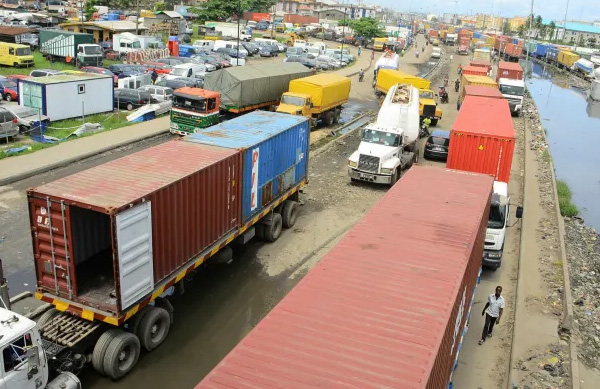Of recent, Mallam Danlami Audu, 62, an investment mogul with extensive networks in the international haulage business was so pleasantly surprised that he could not hide his feelings. He was filled with joy when he visited Lagos on a business inspection trip last December. He said it was a great relief that the protracted Apapa gridlock, which has defied all solutions for more than a decade, has fairly disappeared.
Like other Lagos port users, the businessman confessed that he was shocked that container trucks and tankers that usually flooded the ever-busy Apapa Expressway and sometimes extended to the Fadeyi area had disappeared, leaving a free flow of traffic for commuters. “From Coconut to TinCan Island port to Apapa port complex and Ijora-Apapa road were almost totally free,” Audu said.
For more than 10 years, clearing up the traffic, containers and cargo-carrying trucks from Nigeria’s busiest seaports in the Apapa area of Lagos was a clog in the wheel of the seaborne trade, which constitute enormously to the nation’s economy. After several tactics and deployment of technologies over the years, the gridlock had snowballed into a monster getting stronger with no end in sight. According to stakeholders, the situation graduated from natural to man-made, as some powerful cliques appear to be sabotaging efforts to bring the gridlock to an end. The heavy traffic congestion degenerated to all the link roads, making most of them inaccessible, as trucks and tankers spent weeks and months on the queue before getting to the port.
Various governments tried and failed to tackle the situation, worsening by the day as a result of corruption and the vested interests of highly-placed individuals. However, the situation has greatly improved in the past months as there is the free flow of traffic – thanks to technology and tenacious efforts by the state and federal authorities.
This, according to the head of operations, Special Apapa Traffic Management and Enforcement Compliance Team, Mr Sola Giwa, is achieved by the cooperation between his team and federal officials. His team, which took over from the defunct presidential task force, is mandated by Governor Babajide Sanwo-Olu to ensure that Apapa residents and businesses are able to move in and out of the port city. The enforcement team comprises policemen, LASTMA officials, men from the Federal Road Safety Corps (FRSC) and the NPA security department.
Stakeholders said touting, extortion and racketeering on Apapa and Tincan Island ports access roads have been eliminated by the introduction of the electronic call-up system. According to Sola Giwa, senior special assistant to Governor Babajide Sanwo Olu on Central Business District, the introduction of the electronic call-up system has helped a great deal in controlling truck traffic into Apapa ports. Giwa, who doubles as head of operations, Apapa Traffic Management and Enforcement Committee on the implementation of the call up system, however, pointed out that the people, who were formerly benefiting from the Apapa gridlock, are now fighting back.
While insisting that at least 90 per cent success in the management of traffic along the Surulere-Western Avenue axis leading to the Lagos Port Complex in Apapa, Giwa attributed the success to collaboration the state government and federal officials, especially the Nigerian Ports Authority (NPA) and Trucks Transit Park (TTP).
In his statement, he explained,
“Apapa traffic has improved. The Lagos State, the NPA, and TTP, a private firm in charge of managing the Eto call-up system, have been managing the traffic going into the port. Before we came, there used to be traffic from Onipanu up to the Apapa Port while on the Mile 2 axis, we used to have traffic as far as Cele and sometimes up to Oshodi to the Tin-Can Port. But that is no longer the case.”
Giwa, however, added that the electronic call-up is having issues on the Tin-Can axis due to the bad state of the road and ongoing construction as well as the failure of truckers to make use of the transit parks and shipping companies’ empty containers holding-bays. He added that there were initial inefficiencies in the implementation of the call up system and that was because there was no test-run, describing the system as work in progress. He also said that a manual call-up system was formerly used to control truck traffic into the port and it involved human interference leading to static traffic on the port roads, which no longer exists.
He blamed some pockets of traffic experienced presently on some truckers who insist on coming to the port even when there is no space at the port terminals to attend to them and, as a result, they try to bribe their way into the port. To have access to the ports, Giwa explained that truckers are expected to register on the Eto app and go to the parks approved by the NPA before they can be called up to the port terminal, all also depending on the availability of space and road situation.
According to him, he said that Governor Babajide Sanwo-Olu gave the enforcement team, comprising the Police, LASTMA, FRSC, and NPA security department, the mandate to ensure that Apapa residents and businesses are able to move in and out of the port city. Lamenting that the capacity of Apapa and Tin-Can ports are already overstretched, Giwa hopes that things will enjoy a new lease when the commencement of Lekki Deep Seaport becomes a reality, and other ports in Nigeria and Lagos witness expansion of infrastructure provision, which will help to decongest Lagos ports.
“Lagos is expanding and the state government is providing infrastructure for businesses to thrive. When we see traffic, we see progress as well as development but the management of the traffic is what we do,” he assured.
However, on several occasions, truckers have complained of brazen extortion from them by security agencies, mostly those of the federal government. This is contrary to expectations that the introduction of the electronic call up system would stop all forms of extortion and long hours in traffic.
At a point, it was reported that about 30 toll points have sprung up in Apapa for the collection of illegal monies. Mohammed Bello-Koko, acting managing director of the NPA, was quoted as saying that such an act was a major disincentive to the smooth implementation of the call up system. Reports also alleged that the security operatives, who were apparently sabotaging the call up system, extort millions of naira from truck drivers on daily basis, which are still major problems of the ports.
Have 1 million naira and above to Buy or Sell Cars In Nigeria? Check carlots.ng
All rights reserved. Reproduction, publication, broadcasting, rewriting, or redistribution of this material and other digital content on carmart.ng is strictly prohibited without prior express written permission from Carmart Nigeria - Contact: [email protected]







